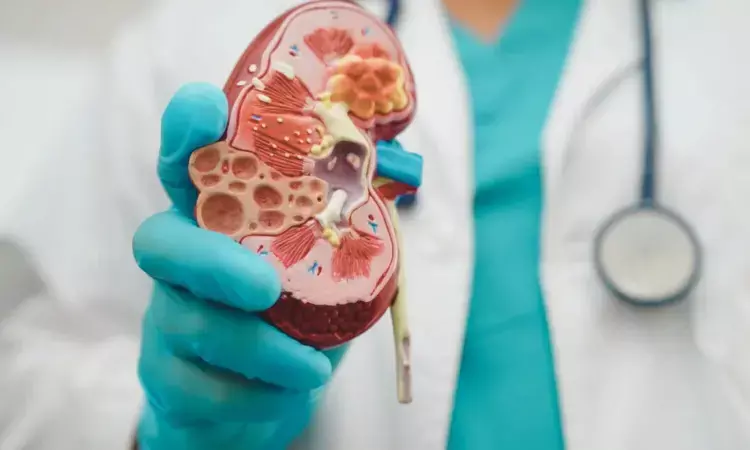- Home
- Medical news & Guidelines
- Anesthesiology
- Cardiology and CTVS
- Critical Care
- Dentistry
- Dermatology
- Diabetes and Endocrinology
- ENT
- Gastroenterology
- Medicine
- Nephrology
- Neurology
- Obstretics-Gynaecology
- Oncology
- Ophthalmology
- Orthopaedics
- Pediatrics-Neonatology
- Psychiatry
- Pulmonology
- Radiology
- Surgery
- Urology
- Laboratory Medicine
- Diet
- Nursing
- Paramedical
- Physiotherapy
- Health news
- Fact Check
- Bone Health Fact Check
- Brain Health Fact Check
- Cancer Related Fact Check
- Child Care Fact Check
- Dental and oral health fact check
- Diabetes and metabolic health fact check
- Diet and Nutrition Fact Check
- Eye and ENT Care Fact Check
- Fitness fact check
- Gut health fact check
- Heart health fact check
- Kidney health fact check
- Medical education fact check
- Men's health fact check
- Respiratory fact check
- Skin and hair care fact check
- Vaccine and Immunization fact check
- Women's health fact check
- AYUSH
- State News
- Andaman and Nicobar Islands
- Andhra Pradesh
- Arunachal Pradesh
- Assam
- Bihar
- Chandigarh
- Chattisgarh
- Dadra and Nagar Haveli
- Daman and Diu
- Delhi
- Goa
- Gujarat
- Haryana
- Himachal Pradesh
- Jammu & Kashmir
- Jharkhand
- Karnataka
- Kerala
- Ladakh
- Lakshadweep
- Madhya Pradesh
- Maharashtra
- Manipur
- Meghalaya
- Mizoram
- Nagaland
- Odisha
- Puducherry
- Punjab
- Rajasthan
- Sikkim
- Tamil Nadu
- Telangana
- Tripura
- Uttar Pradesh
- Uttrakhand
- West Bengal
- Medical Education
- Industry
Time-averaged serum uric acid levels tied to long-term outcomes in IgA nephropathy patients: Study

China: Groundbreaking research has shed light on the intricate relationship between time-averaged serum uric acid (SUA) levels and clinicopathological information, as well as long-term outcomes in patients diagnosed with IgA nephropathy. The study, published in PeerJ, offers valuable insights into the management and prognosis of this prevalent kidney disorder.
Despite prior uncertainty about its prognostic value in IgA nephropathy (IgAN), the findings suggest that time-averaged serum uric acid is an independent risk factor associated with IgAN progression.
Results showed that time-averaged serum uric acid levels were associated with triglyceride levels, renal function, complement component levels, and pathological severity, highlighting its potential value as a prognostic indicator in patients with IgA nephropathy.
IgA nephropathy, also known as Berger's disease, is a chronic kidney condition characterized by the buildup of immunoglobulin A (IgA) deposits in the kidneys, leading to inflammation and impaired kidney function. Despite its widespread prevalence, identifying factors that influence disease progression and outcomes has remained a challenge until now.
Against the above background, Mengjie Weng, Department of Nephrology, Blood Purification Research Center, The First Affiliated Hospital of Fujian Medical University, Fuzhou, Fujian, China, and colleagues aimed to investigate the relevant factors affecting time-averaged SUA (TA-SUA) and to assess its prognostic value in IgAN.
For this purpose, the researchers conducted a retrospective study comprising 152 patients with IgAN. They analyzed the relationships between TA-SUA and clinicopathological features and renal outcomes (defined as the doubling of the baseline serum creatinine level or end-stage renal disease) in groups divided by quartiles of TA-SUA levels, the presence of hyperuricemia, and sex.
The study led to the following findings:
- Patients with high TA-SUA levels had higher levels of baseline SUA, blood urea nitrogen (BUN), triglycerides, serum C3, and serum C4, and were more likely to be male and have proteinuria, hypertension, poor renal function, and pathological injuries, including high grades of tubular atrophy/interstitial fibrosis (T1–T2). These patients had a poorer prognosis compared with patients with low TA-SUA levels.
- The TA-SUA level was positively correlated with baseline age and BUN, triglycerides, serum C3, and serum C4 levels and negatively correlated with baseline eGFR.
- Survival curve analysis indicated that persistent hyperuricemia was associated with significantly poorer renal outcomes than normo-uricemia in both men and women.
- The TA-SUA level was an independent predictor of renal outcome in patients with IgAN, with optimal cutoû values of 451.38 µmol/L (area under the curve (AUC) = 0.934) for men and 492.83 µmol/L (AUC = 0.768) for women.
The results showed that TA-SUA level is associated with serum TG, C3, and C4 levels, as well as renal function and the pathological severity of IgAN.
"According to our data, hyperuricemia significantly promotes IgAN progression, particularly in female patients, whereas its persistence in significant amounts is an independent risk factor for renal function loss in male and female patients," the researchers wrote. "We recommend considering these findings in treatment planning and the design of prospective therapeutic trials."
Reference:
Weng M, Fu B, Zhuo Y, Lin J, Zou Z, Chen Y, Cui J, Li G, Chen C, Xu Y, Jiang D, Wan J. 2024. Association of time-averaged serum uric acid level with clinicopathological information and long-term outcomes in patients with IgA nephropathy. PeerJ 12:e17266 https://doi.org/10.7717/peerj.17266
Dr Kamal Kant Kohli-MBBS, DTCD- a chest specialist with more than 30 years of practice and a flair for writing clinical articles, Dr Kamal Kant Kohli joined Medical Dialogues as a Chief Editor of Medical News. Besides writing articles, as an editor, he proofreads and verifies all the medical content published on Medical Dialogues including those coming from journals, studies,medical conferences,guidelines etc. Email: drkohli@medicaldialogues.in. Contact no. 011-43720751


